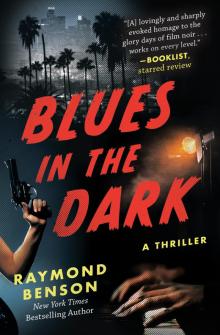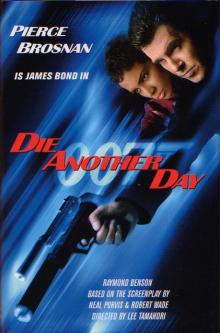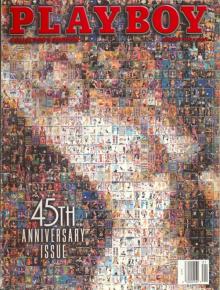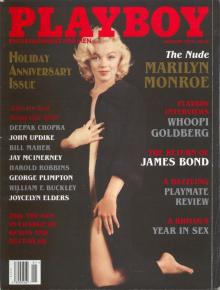- Home
- Raymond Benson
The Rock 'n Roll Detective's Greatest Hits - A Spike Berenger Anthology Page 8
The Rock 'n Roll Detective's Greatest Hits - A Spike Berenger Anthology Read online
Page 8
Brenda stood a moment, staring at one of the bloody Christs, and sighed. “All right,” she finally said. She led the way upstairs, back to the lobby. From there they continued to ascend another staircase to the second floor of the building.
“This is where we run our Day Care,” Brenda said, opening a door to a playroom containing small desks and chairs, cushions for naps, boxes of toys, and other accouterment of a nursery. Suzanne was shocked to see crayon drawings of the crucifixion adorning the walls.
“When are the children here?” Suzanne asked.
“Earlier. From around seven o’clock in the morning until about five-thirty. You just missed everyone. There are roughly twenty children that come here on weekdays. Their parents have to work, you know.”
“Of course.”
As they descended the stairs toward the lobby, Brenda said, “You really should come to one of our services. They’re held every evening, and twice on Saturdays and Sundays.”
“That’s a lot of services.”
“Not all of our members can come to every service, so we hold them often.”
“I see.” Suzanne decided it was now or never. “So, was Flame really a member of your congregation? I read that somewhere.”
A visible change came over Brenda. The sweet smile and angelic aura suddenly disappeared and was replaced by a frown. The brown eyes, earlier so sparkling and pretty, turned cold.
“So,” she said. “That’s why you’re here.”
“I beg your pardon?”
“You’re just a Flame fan, aren’t you? That’s why you came here. You wanted to satisfy your morbid curiosity. I saw you looking at his urn.”
“Uhm, that’s not true.”
“I know it is. I can see it in your face. You know who I am, too. Don’t you. The Lord knows you’re lying.”
Suzanne was taken aback. “Look, I just came in here to look around.”
Brenda abruptly strode toward the front door and opened it. She held it and addressed Suzanne. “If you care to come to one of our services, then I might believe you. Otherwise I must ask you to leave. We’ve had a lot of problems with fans coming here, wanting a piece of Flame. Or me.”
“Sorry,” Suzanne said, sweeping past her. “I’m not what you think.”
As she stepped over the threshold, a large bald-headed man was coming up the steps in front of the building. A black limo that wasn’t there earlier was parked in a reserved space in front of the church.
“Goodbye,” Brenda said behind her. “The Lord knows all and will judge you.”
Suzanne looked back at her guide and couldn’t think of anything to say except, “Thanks!”
The bald man moved past Suzanne and glanced at her, but he said nothing. Brenda held the door open for him and then shut it once he was inside.
Suzanne felt yet another chill—the second one that day. An incredibly weird vibe emanated from that guy. Who was he? She had a vague feeling that he was familiar to her, but it could have just been the willies she had been experiencing ever since stepping into the freaky place.
One thing was for sure—the Messengers were a scary bunch of grade-A wackos.
9
Mother
(performed by John Lennon)
After he had taken a look at the mess of guitar strings that had been delivered to Rockin’ Security, Berenger threw the package in a drawer and tried to forget about it. He had more pressing things on his mind at the moment, so he ate a quick meal from the deli on Second Avenue, got his 2005 Nissan Altima 2.5 SL sedan out of his building’s garage, and headed for the Queens Midtown Tunnel. He paid a fortune for a parking space in the garage but it was a necessary expense. The car was his CD player on wheels and he was loath to park it on the street. He rarely used the Altima when his work centered in Manhattan. Public transportation and taxis were the way to go within the city. But when he had to travel beyond Manhattan island, Berenger preferred to travel in style. The SL came standard with a four-cylinder engine mated to an automatic transmission, and it coddled occupants with heated leather seats, an eight-way power driver's seat, a trip computer and a six-disc CD changer with stereo controls mounted on the leather-wrapped steering wheel. It was a luxury vehicle but not so much that it would attract attention in the event he had to shadow someone or sit and stake out a building. Berenger had originally considered purchasing a Corvette but decided it was too much of an eye-catcher.
He had put on Gentle Giant’s classic Prog Rock CD, Free Hand, and tried to groove to the syncopated complexity of “Just the Same” when he realized it didn’t fit his mood. That was an album for feeling good and ever since he had received the call from Franklin Village, he had not been jumping with joy. He changed the CD to something to match his gloom—Neil Young and Crazy Horse’s Sleeps With Angels. There was something about Young’s plaintive voice and the raw grunge guitars of the Horse that fit neatly with melancholy.
Berenger’s seventy-nine year old mother Ann had moved to Long Island after she found her second husband in 1973. The period when she and Berenger’s real father were married, back in Austin, Texas, now seemed like a fairytale. The memories of his parents were good but things changed drastically after their divorce. It happened when he was still in high school. The announcement came as a shock to him, for he naively thought his parents were happy. One day Berenger had come home from tenth grade to find his father crying in the kitchen. His wife had left him for another man. Berenger remembered that he didn’t believe his father and refused to accept it, even after two weeks. When he finally spoke to his mother he was still in denial. She didn’t waste any time moving to New York with her new beau, Abraham Berkowitz, a tailor she had met at the department store where she worked. Berenger stayed in Austin with his father so he could graduate in 1975 without having to change high schools. His younger brother Carl wasn’t so fortunate. He moved to Long Island with their mother and new stepfather with the idea that he would begin high school at the new location.
It took Berenger several years to realize he had joined the army directly after graduating as a result of his mother’s departure. He had been full of anger during those years and the army provided him an outlet. Three years in Southeast Asia did little to ease the anger. Even though the war was officially over, there was still enough covert military activity for the U.S. in Vietnam and surrounding areas to keep Berenger occupied. Berenger was based in the Philippines and worked as a Special Agent in the Criminal Investigations Division, which may have served to dampen his feelings of resentment toward his mother but it also gave him a radically new outlook on life. When he finally returned to the States, he had more or less forgiven her. By the mid-eighties, he had come to love and admire his stepfather and tried to visit his mom in New York as often as he could.
Daniel Berenger never remarried. He had died of heart failure in 1990 but Berenger knew that the old man’s heart had actually failed in 1973, when Ann left him. Ann’s husband Abraham died of cancer in 1999 and that’s when things started to fall apart with Berenger’s mother. She had already begun to show signs of dementia and Abraham had expressed his concern to Berenger on several occasions. After his stepfather’s death, Berenger made the difficult decision to move his mother into an assisted living facility. His brother Carl, now an attorney in Los Angeles, supported the move and flew east to help with the transition.
Nothing produced guilt more than doing something like that to one’s parent. Berenger attempted to convince himself that he wasn’t sentencing his mother to a prison. After all, she would receive full-time care and be around other people her age. She would have activities and things to keep her mind occupied. And most importantly, she’d be safe—from herself. Still, it saddened Berenger every time he went to visit. Franklin Village was a beautiful and well-run outfit, and it was certainly better than a nursing home, but he still found it depressing. It was a constant reminder that everyone eventually grew old and had to deal with the final days of life.
Traffic wa
s lighter than he had expected so Berenger reached Hempstead in record time after leaving Queens. He pulled into the Franklin Village parking lot and took a moment to prepare himself. This wasn’t going to be easy.
He went inside the building, signed in, and went to the administrator’s office, where Betty Samuels was waiting for him.
“Hello, Mister Berenger, how are you?” she said, greeting him.
“Fine, thanks. How’s my mom?”
“She’s doing swell. I thought perhaps we’d talk before you went to see her.”
“Okay.”
He sat in one of the chairs in front of the woman’s desk as she spoke. “Your mother was examined today by one of the nurses. She didn’t pass many of the simple memory tests we can administer here. I suggest you make an appointment with her physician to do some more thorough testing. But we talked about this the last time you were here. She’s definitely showing more pronounced signs of Alzheimer’s, I’m sorry to say.”
“I know,” Berenger replied. “It’s been getting worse since she got here. Last time I was here she wasn’t sure if I was my brother or me. It must have something to do with the lack of companionship. You know, her husband dying and all.”
“Yes, I’m sure that contributes to it. At any rate, we’ve picked out a room in the Neighborhood that’s identical to the one she’s in now. You’ve been through the Neighborhood, haven’t you?”
Berenger nodded. The dementia unit was indeed a mirror image of the regular wards except that the residents were unable to leave the wing. They were kept separate from the rest of the population and even had their own dining room. Unfortunately this accentuated the notion that the occupants were “patients.” Some of them felt like inmates.
Mrs. Samuels continued. “I did mention last time that because your mother has been a resident for more than two years, you’ll receive a discount on the monthly payments. Normally the Neighborhood rooms run twenty per cent higher than those in the open wards; in your case it’s ten per cent.”
Berenger shrugged and said, “Thanks.” It didn’t matter. A prison was a prison even if the attendants were kind ladies in white uniforms instead of mean, burly male guards. He couldn’t imagine having to live the last days of his life in such an environment, but there was no telling how things would turn out. The bottom line was his mother was ill and there was nothing else he could do about it. He had to keep telling himself that he was doing the right thing.
“So if it’s all right with you, we’d like to move her tomorrow.”
“Tomorrow?”
“I think it’s best,” Mrs. Samuels said.
Berenger stroked his beard. “Gee. I didn’t expect it to happen so soon.”
“We just can’t be responsible if she pulls another stunt like she did today. Our staff is diligent but they can’t have eyes on everyone all the time. You understand.”
He shrugged and nodded. “Okay. Do I need to help with the move?”
“Oh, no. We have people to do that. All you have to do is come back tomorrow evening and see her in her new place. I’m telling you, very few of our Neighborhood residents actually realize they’ve been moved.”
“Well, my mom’s not that far gone yet.”
Mrs. Samuels pursed her lips.
“Is she?”
“Why don’t we go look in on her?” Mrs. Samuels suggested.
They stood and walked out of the office and into the commons, a large open area where the residents sat with visitors, played cards at tables, or read. There were other recreational rooms with televisions, a gym, a beauty salon, a library, and a snack bar. Berenger liked the place because it felt more like a hotel than an assisted living facility. He supposed that perception would change once his mother moved into the Neighborhood.
Ann Berkowitz was in one of the two television rooms off to the side of the commons, watching Friends. Three other women sat near her—they were laughing and enjoying the program but she was not. Every time he saw her now, she appeared smaller for some reason. Was she shrinking? She was much tinier than Berenger remembered her being when he was growing up. Now she looked so fragile and elderly. It nearly broke his heart.
When he entered the room she looked up. He could swear that there was a moment’s pause before the glint of recognition appeared in her eyes.
“Hi mom, how you doing?” he asked.
“There wasn’t any butter,” she said.
“What’s that?”
“There wasn’t any butter. I told them a hundred times they need butter on the table.”
He looked at Mrs. Samuels for an explanation. She didn’t have a clue either.
“Come on, mom, let’s go for a little walk.” He helped her up and she walked with him out of the room.
“I’ll leave you two alone for a bit,” Mrs. Samuels said. “I’ll be in my office if you need me.”
“Thanks,” he said. He allowed his mother to put her arm through his.
“Such a gentleman,” she said, smiling. It was good to see her smile. “Just like Abe. You met Abe, didn’t you?” She meant her late husband.
“Of course, mom. Abe was a great guy.”
“Of course you met him, how could I be so silly. Yeah, he was a great guy. My parents liked him a lot, too.”
Berenger wrinkled his brow. Her parents were long dead by the time she’d met Abraham Berkowitz. He didn’t say anything until they reached the commons and sat on one of the big sofas in front of an unlit fireplace.
“Listen, mom, tomorrow they’re gonna move you into a new room,” he said.
“Huh? Why?”
“Well, it’s a better room. We thought you’d like a nicer room.”
“I don’t want a nicer room. Not unless I can have my apartment back.”
“What apartment, mom?”
“The one I shared with Cindy.”
“Cindy?” At first he couldn’t remember anyone named Cindy. Then it hit him. “You mean Cindy? Your college roommate?” His mom’s best friend from school was named Cindy Watkins. She had been around when Berenger was a kid. Cindy was dead now, too.
“Cindy and I have a nice apartment. Can I go back there?”
“Mom, you lived with Cindy when you were going to college at Florida State. That was a long time ago.”
“Oh. I miss Cindy. Have you seen her lately?”
“No, mom, I haven’t.” Mrs. Samuels was right. It was getting worse. “Look, mom, don’t worry. You’re gonna love the new room. You may not even know the difference. They’re gonna take you someplace fun tomorrow, like to the mall or something, and then when you come back in the afternoon all your things will be moved.”
She wasn’t listening. Instead she was fumbling through her little purse that she always carried with her. There wasn’t much in there. Residents didn’t need to keep billfolds, money, keys, or other items younger people took for granted. She finally found a tube of lipstick and showed it to Berenger.
“Here it is,” she said. “I’ve been looking for this.”
“Whatcha need lipstick for now, mom?” he asked.
She looked confused. “Lip—?” She eyed it and put it back in her purse. “Oh. I thought it was…” She shook her head slightly and then shrugged it off. “So how’s work?” she asked.
“Work’s fine, mom. Hey, I talked to Carl the other day. He said to send you his love.”
“Carl’s a good boy,” she replied. She patted Berenger on the cheek. “So are you, honey. You’re just like a son to me.”
Aww geez, he thought.
Berenger made a glass of Jack Daniel’s on the rocks and sat in the easy chair that dominated the living room of his Upper East Side apartment. He picked up the television remote and almost switched on the set but decided against it. He was too depressed to watch the crap on TV.
It had been a trying evening. He hated seeing his mother in her condition. At least she still maintained a pleasant composure. He knew some Alzheimer’s patients became terribly angry and belli
gerent with the world around them. In many ways they were aware of what was happening to them and couldn’t deal with it—hence, they lashed out at their loved ones and anyone else that invaded their space. It was truly a cruel disease.
Berenger allowed himself to wander through memories of Ann Berkowitz when she still lived at home. Of course, she had been Ann Berenger then. She had been a babe and enjoyed flirting with other men. His poor father didn’t have a chance. She had always set her sights above and beyond Daniel Berenger and nothing was going to stop her from attaining the level of satisfaction with life and love she desired. It was only recently that Berenger began to admire this trait in her because he recognized it in himself.
He reached over the arm of the chair and picked up his CF Martin D-15 acoustic guitar from its stand. It wasn’t particularly high-end—all his good stuff was at the office studio—but it was a wonderful instrument to mess around with at home. He set it in his lap and wrapped the fingers of his left hand around the rosewood fingerboard and strummed a loud E minor chord. From there he went to an A major and back to E minor. Berenger began to riff on the two chords, creating a melancholy melody that complemented his mood. After a minute or two, he went into an old song he had written for his band, The Fixers. It was their one single, a tune called “Moonbeams on Mars.” As far as he knew, it was never played on any radio station, even in Austin, where the band enjoyed a small following.
Berenger formed The Fixers with his friend Charlie Potts after he had come home from Southeast Asia in 1978. He had learned his current trade in the army but he wouldn’t explore it further for another fifteen years. The stint with CID had toughened him and gave him discipline—but his heart had always been in music. His high school band had been a lot of fun but as with most teenage garage bands, there was no money to be had. Lugging around equipment in a borrowed van was more hassle than it was worth. With the money he had saved from his army salary, Berenger invested in a decent rig, called up Charlie, and before long they were jamming in Daniel Berenger’s garage, just like they had done in high school. When they added two more guys to fill out the sound, Berenger realized that they had something worthwhile going.

 The James Bond Bedside Companion
The James Bond Bedside Companion The Black Stiletto's Autograph
The Black Stiletto's Autograph Blues in the Dark
Blues in the Dark Zero Minus Ten
Zero Minus Ten The Black Stiletto
The Black Stiletto Doubleshot
Doubleshot High Time To Kill rbb-3
High Time To Kill rbb-3 Bond Movies 07 - Die Another Day
Bond Movies 07 - Die Another Day The Facts Of Death
The Facts Of Death Midsummer Night's Doom
Midsummer Night's Doom Blast from the Past
Blast from the Past The Secrets on Chicory Lane
The Secrets on Chicory Lane High Time To Kill
High Time To Kill The Black Stiletto: Black & White
The Black Stiletto: Black & White The World Is Not Enough jb-1
The World Is Not Enough jb-1 Zero Minus Ten rbb-1
Zero Minus Ten rbb-1 In the Hush of the Night
In the Hush of the Night The Black Stiletto: Stars & Stripes
The Black Stiletto: Stars & Stripes Bond Movies 06 - The World Is Not Enough
Bond Movies 06 - The World Is Not Enough The Rock 'n Roll Detective's Greatest Hits - A Spike Berenger Anthology
The Rock 'n Roll Detective's Greatest Hits - A Spike Berenger Anthology Never Dream Of Dying
Never Dream Of Dying